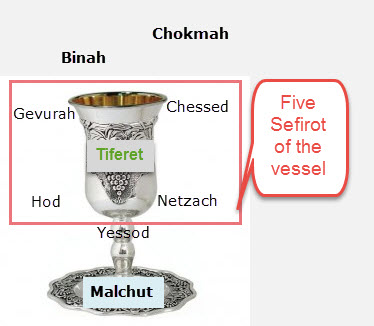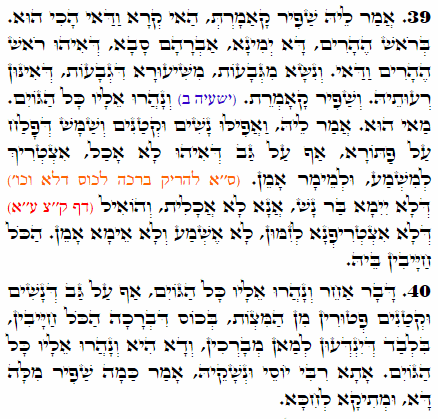Daily Zohar # 2060 – Ki Tisa – The Cup of Blessings


.
Hebrew translation:
40. דָּבָר אַחֵר וְנָהֲרוּ אֵלָיו כָּל הַגּוֹיִם – אַף עַל גַּב שֶׁנָּשִׁים וּקְטַנִּים פְּטוּרִים מִן הַמִּצְווֹת, בְּכוֹס שֶׁל בְּרָכָה הַכֹּל חַיָּבִים, וּבִלְבַד שֶׁיֵּדְעוּ אֶת מִי מְבָרְכִים, וְזֶהוּ וְנָהֲרוּ אֵלָיו כָּל הַגּוֹיִם. בָּא רַבִּי יוֹסֵי וּנְשָׁקוֹ. אָמַר, כַּמָּה יָפֶה דָּבָר זֶה וּמָתוֹק לַחֵךְ.
.
Zohar Ki Tisa
Isaiah 2:2
“וְהָיָה בְּאַחֲרִית הַיָּמִים, נָכוֹן יִהְיֶה הַר בֵּית-יְהוָה בְּרֹאשׁ הֶהָרִים, וְנִשָּׂא, מִגְּבָעוֹת; וְנָהֲרוּ אֵלָיו, כָּל-הַגּוֹיִם”
“It shall come to pass in the end of days that the mountain of the house of YHVH shall be established as the highest (head) of the mountains, and shall be above the hills; and all the nations shall flow to it”
This verse is about the revelation of the Third Holy Temple in Jerusalem that will bring Light for all nations of the world.
The Zohar brings another understanding of this verse and connects it to another aspect of great blessings.
The ‘End of Days’ is Malchut and the ‘highest of the mountains’ is Abraham and the aspect of Chessed. Like the high priest he has a connection to Chokmah that is the ‘head’ and the highest of all.
Chessed is the head of the lower seven sefirot and continues the blessings to Malchut.
‘Above the hills’ is Binah that brings the blessings from Chokmah to Chessed that is the top of the vessel, which is the aspect of Malchut and the ‘Cup of Blessings’.
The most important connection to the ‘cup of blessings’ is the kiddush of Shabbat. It elevates us to Binah and ‘fills’ our cup with the Light of Shabbat.
Men and women are obligated to say kiddush on Shabbat to fulfill the precept from the 10 commandments (Exodus 20:7 and Deuteronomy 5:11) .
The cup of blessings should be held with the right hand. The five fingers represent the five Sefirot of the vessel. Best way to hold the cup is to place the cup on the palm of the hand and the fingers pointing up but as long as the five fingers touch the cup, the blessings come down in full. The cup should be raised above the surface of the table for the aspect of elevating to Binah.
In the absence of a man (over 13 years old), a women, married or not, should do Kiddush on Shabbat. Listening to full kiddush after Shabbat services and answering Amen is sufficient to make the connection.
You may ask more questions in the comments area below.
{||}

 Previous: Ki Tisa
Previous: Ki Tisa
